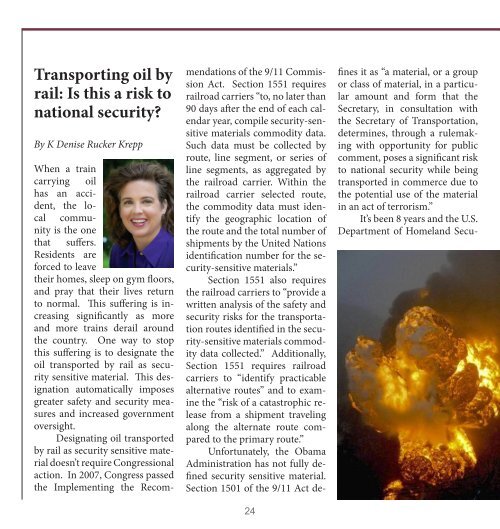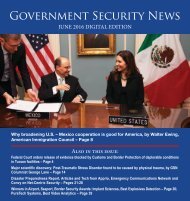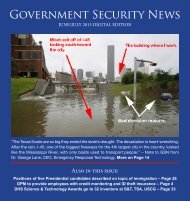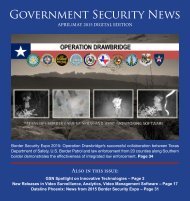Government Security News
You also want an ePaper? Increase the reach of your titles
YUMPU automatically turns print PDFs into web optimized ePapers that Google loves.
Transporting oil by<br />
rail: Is this a risk to<br />
national security?<br />
By K Denise Rucker Krepp<br />
24<br />
When a train<br />
carrying oil<br />
has an accident,<br />
the local<br />
community<br />
is the one<br />
that suffers.<br />
Residents are<br />
forced to leave<br />
their homes, sleep on gym floors,<br />
and pray that their lives return<br />
to normal. This suffering is increasing<br />
significantly as more<br />
and more trains derail around<br />
the country. One way to stop<br />
this suffering is to designate the<br />
oil transported by rail as security<br />
sensitive material. This designation<br />
automatically imposes<br />
greater safety and security measures<br />
and increased government<br />
oversight.<br />
Designating oil transported<br />
by rail as security sensitive material<br />
doesn’t require Congressional<br />
action. In 2007, Congress passed<br />
the Implementing the Recommendations<br />
of the 9/11 Commission<br />
Act. Section 1551 requires<br />
railroad carriers “to, no later than<br />
90 days after the end of each calendar<br />
year, compile security-sensitive<br />
materials commodity data.<br />
Such data must be collected by<br />
route, line segment, or series of<br />
line segments, as aggregated by<br />
the railroad carrier. Within the<br />
railroad carrier selected route,<br />
the commodity data must identify<br />
the geographic location of<br />
the route and the total number of<br />
shipments by the United Nations<br />
identification number for the security-sensitive<br />
materials.”<br />
Section 1551 also requires<br />
the railroad carriers to “provide a<br />
written analysis of the safety and<br />
security risks for the transportation<br />
routes identified in the security-sensitive<br />
materials commodity<br />
data collected.” Additionally,<br />
Section 1551 requires railroad<br />
carriers to “identify practicable<br />
alternative routes” and to examine<br />
the “risk of a catastrophic release<br />
from a shipment traveling<br />
along the alternate route compared<br />
to the primary route.”<br />
Unfortunately, the Obama<br />
Administration has not fully defined<br />
security sensitive material.<br />
Section 1501 of the 9/11 Act defines<br />
it as “a material, or a group<br />
or class of material, in a particular<br />
amount and form that the<br />
Secretary, in consultation with<br />
the Secretary of Transportation,<br />
determines, through a rulemaking<br />
with opportunity for public<br />
comment, poses a significant risk<br />
to national security while being<br />
transported in commerce due to<br />
the potential use of the material<br />
in an act of terrorism.”<br />
It’s been 8 years and the U.S.<br />
Department of Homeland Secu-







